Results
-
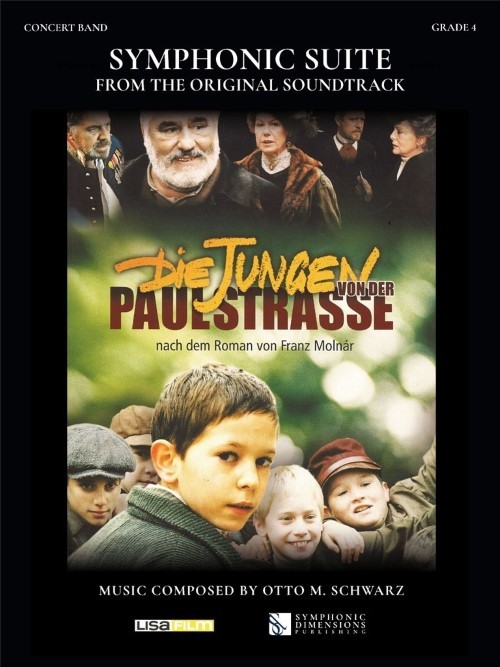 £122.50
£122.50Die Jungen von der Paulstrasse, Symphonic Suite from (Concert Band - Score and Parts) - Schwarz, Otto M.
In 1910, the novel Die Jungen von der Paulstrasse (The Boys from Paulstrasse) was published, written by Ferenc Molnar, probably the most important Hungarian playwright of the 20th century. In 2004, film adaptation of the novel was released, and Otto M. Schwarz wrote the music for the 90-minute German-language version. The Symphonic Suite is a compilation of various main themes from the soundtrack.Duration: 8.00
Estimated dispatch 7-14 working days
-
 £79.50
£79.50Rondo: From Third Suite - Chris M. Bernotas
Arranged by Chris M. Bernotas, this rendition of "Rondo" from Jager's timeless Third Suite is thoughtfully scored for intermediate-level bands. The opening five-chord sequence connects each of the sections in this rondo. Memorable main themes and countermelodies, coupled with rhythmic drive, propel the music forward with momentum and excitement straight through to the end. Rondo is rich with teachable moments, making it an excellent choice for your concert's opening or closing piece. (2:20)
Estimated dispatch 7-14 working days
-
 £79.50
£79.50Fantastic Beasts: The Secrets of Dumbledore, Music from (Concert Band - Score and Parts) - Howard, James Newton - Bernotas, Chris M.
Fantastic Beasts: The Secrets of Dumbledore is as musically intriguing as the motion picture's storyline with its stunning music by James Newton Howard. The magic and mystery of this instalment of J.K. Rowling's adventure will come to life with this exciting arrangement by Chris M. Bernotas. Featuring these highlights from the score:The Secrets of DumbledoreLallyCountersightThe Room We RequireHedwig's ThemeDuration: 4:30
Estimated dispatch 7-14 working days
-
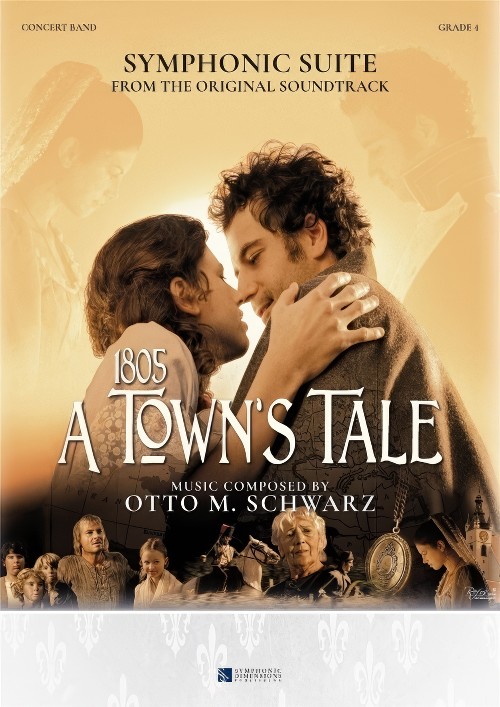 £127.99
£127.991805: A Town's Tale, Symphonic Suite from (Concert Band - Score and Parts) - Schwarz, Otto M.
In 2013 the short film 1805 A Town's Tale was released, produced by Refos Film, with music by Otto M. Schwarz. A fateful autumn day in the year 1805: the morning mists hang heavy over the sprawling field near Drnstein. The captain's tent and some smaller tents are seemingly lifeless in their deep slumber. In dawn's half-light, the fires now only steam and barely glow. A figure sneaks past the main tent. This is Phillipe, a soldier of Napoleon's troops, leaving the camp early to warn Mina, his lover, and the other inhabitants of the town of Krems of the planned raid. The Symphonic Suite is a compilation of various main themes from the soundtrack.Duration: 9.45
Estimated dispatch 7-14 working days
-
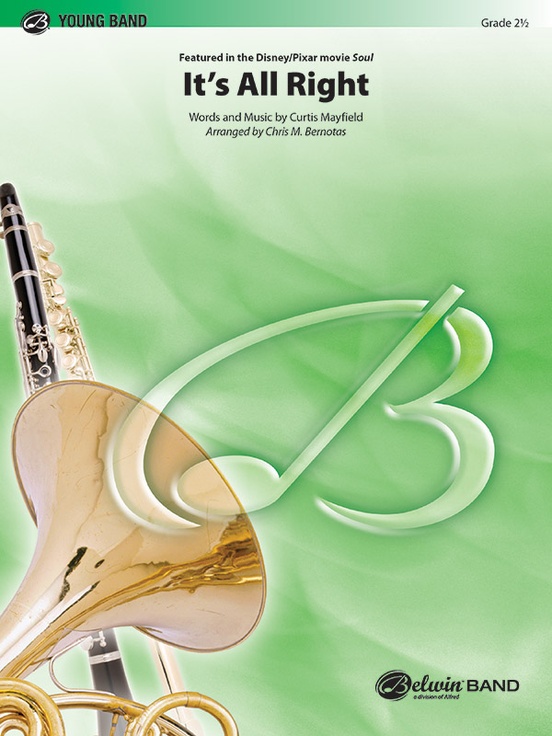 £63.00
£63.00It's All Right (from Soul) (Concert Band - Score and Parts) - Mayfield, Curtis - Bernotas, Chris M.
Written by Curtis Mayfield and made famous in the 1960s by The Impressions, this timeless classic has been covered by several major artists and was featured in the Disney/Pixar smash hit movie Soul. This arrangement by Chris M. Bernotas will put a smile on everyone's face and will be a great way to help students learn to play in the swing style. Duration: 2.30
Estimated dispatch 7-14 working days
-
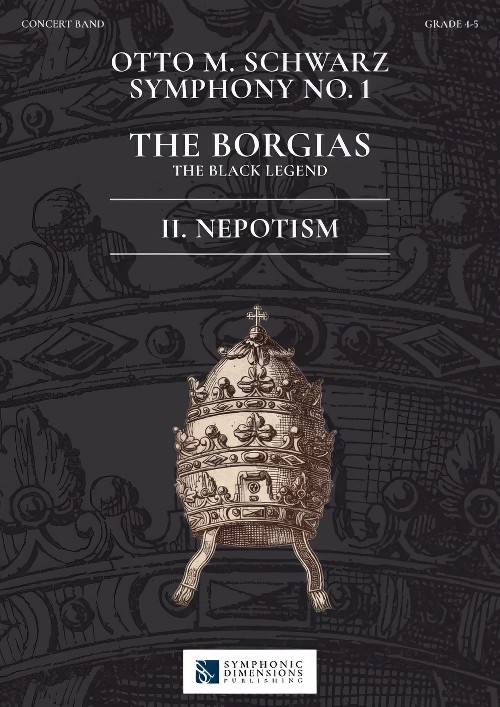 £148.99
£148.99Nepotism (Movement II from Symphony No.1, The Borgias) (Concert Band - Score and Parts) - Schwarz, Otto M.
A sinister legend hangs over the Borgia family, a legend of corruption, abuse of power, orgies, sex and murder. These rumours proliferated especially during the papacy of Alexander VI, a descendant of the family, who was even called the Antichrist. On his death, contemporary witnesses reported that the devil himself prowled around the death chamber and a black dog run along the corridors of the Vatican as his emissary. One might say that this Borgia pope, who ruled together with his family with the greatest brutality, became demonised. Unscrupulousness, poison-toting, incest and other malice are to this day the hallmarks of this pontiffNepotism: Rodrigo Borgia was elected Pope on 11 August 1492. From the very start, the new pope was prepared to use any means to eliminate his opponents, either through the infamous Borgia poison or by excommunication and execution. His son Cesare, who wanted little to do with the church, was appointed cardinal against his will. Alessandro Farnese, broth of Giulia Farnese, the Pope's mistress, also became a cardinal. Numerous Spaniards were brought into the country and were appointed to ecclesiastical posts. This infuriated the opponents of Alexander VI. The Dominican Girolamo Savonarola from Florence demanded the removal of the Pope. He was tortured and banned. Giuliano della Rovere wanted to convene councils to depose the Pope, which Alexander managed to prevent through artful political manoeuvrings. Through great brutality, brilliant political skill and power games, this pope was able to achieve his goal of leaving for his children a great legacy. Alexander VI constantly changed his allies and always acted unscrupulously to improve his financial situation and expand his sphere of influence. At the centre of the second movement of this work is the medieval hymn Dies Irae (Day of Wrath), which acts as a warning in the background condemning the Pope's actions.Duration: 9.15
Estimated dispatch 7-14 working days
-
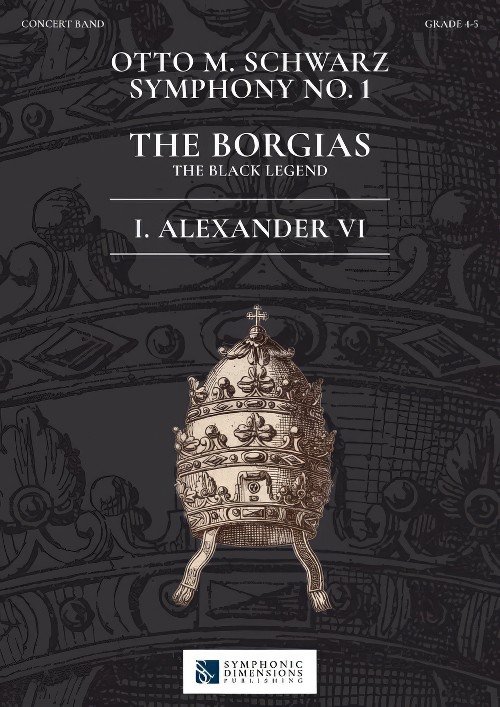 £148.99
£148.99Alexander VI (Movement I from Symphony No.1, The Borgias) (Concert Band - Score and Parts) - Schwarz, Otto M.
The Borgia family is the subject of a so-called black legend, a pejorative term that has been used since the Middle Ages to refer to Spain and Spaniards. The Borgias' black legend is one of corruption, abuse of power, orgies, sex and murder. These rumours spread especially during the reign of Pope Alexander VI, a member of the family. Alexander was even referred to as the Antichrist. According to eyewitnesses, when he died Satan prowled the death chamber and a black dog, an envoy of the Devil, ran up and down the aisles of the Vatican. The brutal rule of Pope Alexander and his family led to a kind of demonization of the Borgia family. But it is precisely the lack of scruples, the brewing of poisons, the incest and various cruelties that continue to hold a certain fascination for us.Alexander VI: Rodrigo Borgia was born in 1431 near Valencia. He studied law in Bologna and, through his uncle Pope Calixtus III, he rose through the church hierarchy. As vice-chancellor of the Holy Roman Catholic church, he became one of the richest men in Europe. As a cardinal he fathered four children who he later legitimised when he became pope. His election to the papacy was funded by the sale of offices, extortion and bribes of all kinds. Through an alliance with Ascanio Sforza he was elected pope on August 11 1492 and named himself from then on Alexander VI, an allusion to Alexander the Great.Duration: 9.30
Estimated dispatch 7-14 working days
-
£74.60
Song From 'M.A.S.H.' - Johnny Mandel
Estimated dispatch 7-14 working days
-
 £56.00
£56.00Selections from H.M.S Pianofore - Arthur Sullivan
A sparkling medley from one of the best-known of Gilbert and Sullivan's operettas has been deftly prepared by the always skillful Andrew Balent. The medley includes five selections from the original work: We Sail the Ocean Blue, I'm Called Little Buttercup (a trumpet solo), I Am the Monarch of the Sea, When I Was a Lad and He Is an Englishman.
Estimated dispatch 12-14 working days
-
 £84.50
£84.50Selections from H.M.S Pianofore - Arthur Sullivan
A sparkling medley from one of the best-known of Gilbert and Sullivan's operettas has been deftly prepared by the always skillful Andrew Balent. The medley includes five selections from the original work: We Sail the Ocean Blue, I'm Called Little Buttercup (a trumpet solo), I Am the Monarch of the Sea, When I Was a Lad and He Is an Englishman.
Estimated dispatch 7-14 working days
